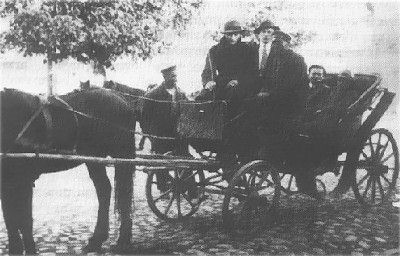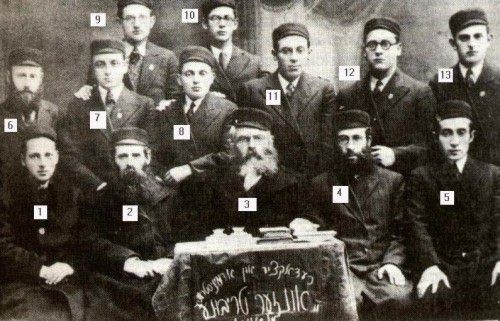Mlawa
The Old Home Town
Written by: Dr. Ze'ev Jonis in 1949
Chapter 1:
The City
|
Mlawa: A Dorsky and its passengers |
As one wandered over Mazowsze, the northern part of Poland, in a train travelling from Warsaw to Danzig or, via a road leading to the land of the Kaszuby - to the Baltic Sea - one reached Wyszyny, Konopke or Szydlowa, villages along the way.
From the endless plains the skies, as usual, reflected a dark forest, several huts, lone trees jutting out from the damp fields and weeds enveloped by gray-white mists, like stacks of light smoke.
If not for the forest, one could see across vast distances. All of a sudden, small towers and roofs loomed up over the hills and peeped out of the plain - a rare sight in those surroundings.
From afar it seemed as though one had arrived at the gates of an ancient crusader castle standing out over the entire region.
As one neared, this far off, enchanted vision disappeared and one saw a small town, similar to many other such towns, all built in the same fashion in the regions of Poland bordering on Germany.
Mlawa, the principal city of the country across the Wkra - Mlawa river, spread out over the hills. Mornings and evenings, the city wrapped in thick gray mists like something unreal, often dissolved away and disappeared from the face of the earth.
The old market place was in the middle of the town. In the center of the market, on a large and wide base of stones, stood a pure white building built in the 16th century. The building was covered with red shingles. Hugging the four walls like a black belt was a Latin inscription: “The same measure of justice applies to poor and rich, to citizens and new inhabitants, 1789.”
Above the roof a hexagonal, gray turret with four, round openings reached out to the skies, overlooking all four directions of the wind. The town clock was here. Every quarter of an hour, its hoarse and familiar ring reverberated through the air.
Children stood in the market place and looked at the clock's black hands slowly revolving around its white face and waited for the clock to strike.
Quite often the hands of the clock stood still. No peal was heard. Time seemed to have been arrested. A silent sadness filled the heart. The whole town impatiently waited for Moshe Wilner to get up, climb the tower and reset the clock. The town's time was in his hands. Sometimes one of the lads he met along the way climbed the tower with him.
Not only the town clock was housed in this building. The town keys were also to be found here in the Town Hall. This was where the mayor's office was.
A long time ago, the Jews had had almost no contact with the Municipality. No one asked their advice, what and how matters were to be carried out. Their only obligation had been to pay taxes. Later the Jews were permitted to express their opinion about how the city should be run. It even happened that in this city of the patron-saint Wojciech, Mendel Marker occupied the mayor's seat for several years.
In the time of the Russian rule two synagogue beadles often came to the Municipality. One was Zanvel Langleben, the Rabbi's attendant, the other - Moshke Shamash (beadle) known as “Moshke the Prankster”. Because of Zanvel, the names of many of the town's Jews were distorted. Moshe was called Moshik, Izhak-Itzik, Sarah-Saltcha, and so on. It was Zanvel who registered Jewish births in the town books. In order to save respectable men of means the trouble of going to the Municipality and signing the birth certificates, he declared that they were illiterate. That is why many of the Jews of Mlawa had odd names, false names. The dates of birth were recorded according to Zanvel Langleben's fancy. His schemes and calculations were intended to benefit those registered, in the future, when they were to be conscripted. In addition, Zanvel registered the Jewish weddings in the town books. That is why he was always slightly tipsy as though coming from a festive meal.
Moshke Shamash was an entirely different character. He was thin, pale, and gray-haired. Whenever someone died, he would appear on the scene, a lantern in his hand, as though sent by the Angel of Death himself to illuminate the last journey of the newly deceased. Moshke used to come to the Municipality to ask for a death certificate and to strike off the deceased's name from the city register.
Both sectors of the population, Jews and Gentiles, lived near Town Hall, each in its own fashion. In the middle of the market, the Jews had nine shops, one on top of the other, in long row alongside Town Hall. From the other side of the building, the Gentile church and its yard stretched out like a garden of green.
Who knows how far the market would have reached if not for the houses and shops that stood like a fence on all four sides. The families: Landau, Perla, Eichler, Konecki and Frank, “Sweet Rifka”, Berish Tzeitag, Haim Zelaska, and Moshe Opotowski occupied one side with their shops and houses. Opposite them resided Henoch Zilbergerg, Wisman - “Panicz,” Abraham Isaac Biezunski, Yizhak Rosen, Shimon Lipsker, Kaufman and Baruch Eisenberg. On the two remaining sides lived and traded: Wolf Brachfeld, Leib Lipshitz, Yossel Perlmutter, Yehuda Mayer Lidzbarski, David Hirsch Makowski, Feivish Shapira, Moshe Bialik and others.
All the shops in the Old Market, except for the two pharmacies and the bakery, belonged to Jews. There was a long succession of stores filled with supplies of iron, groceries, leather, fabrics, and haberdashery that were sold retail or wholesale to the inhabitants of the city and of the towns and villages in the vicinity. So it was for a long time.
In the last few years before Poland's emancipation, Polish shops suddenly popped up. The “Spojnia” located itself in the market place and the boycott against the Jews and their stores began.
The Old Market was the busiest spot in town.
From all sides, long streets raced in pairs like the wings of a windmill. Streets and people, the city's entire life was centered around the market place. Here raced Warsaw and Chorzel Streets, there dashed Plock and Granary Streets. At the other end were Nieborg and Szkolni Streets; from a different angle, Zaldowi Street and the New Market.
The streets ran among small wooden houses, several small houses built of stone, then up the hill and down again. In a straight line or a crooked one they extended all along the city. Somewhere, outside town, between fields and woods they joined various roads that connected Mlawa with other cities and towns.
At the end of every street was the beginning of a road. From Warsaw Street, Warsaw Road began and led to Ciechanow, Modlin, Nasielsk, Przasnysz, Makow and Plock, finally reaching Warsaw. From Plock Street, the road led to Strzegowo, Racionz, Sierpce, Plock or Radzanow, Szrensk, Biezun and Zielun. Nieborg Street led to the border through a forest and continued until Prussia. From Ziolda Street it was possible to get to the train station in Wolka or from there, via the border to Ilowo. Long streets connected the city to the outside world. Alleys and lanes joined one city street to another. Only Jews lived on Warsaw and Plock Streets and in nearby Synagogue Lane, Cobblers Lane and Potters Street. In the other streets and lanes there was a mixed population: near the market, Jews and Gentiles and as one neared the outskirts of town, only Gentiles.
Here and there stood an iron pump, a silent witness in the middle of the street. Inns (“zajazdy”) were scattered in various corners, noisy with the din of man and beast on market days.
Granaries built of wood or stone could be found in all parts of the city. Wherever you turned there was a granary covered with an awning and on all sides, doors like open mouths waiting to receive the abundant wheat from the fertile fields of Mazowsze. Jewish commission agents, buyers and sellers of second-hand gods, merchants, porters, wagoners and craftsmen were to be found there. A great portion of the city's inhabitants made a living from dealing in wheat.
The streets were paved with round fieldstones like the vertebrae of a strong back prepared to carry a heavy load. Small stones were packed on either side as though framed by weeds. Sometimes the stones crumbled like teeth in an old man's mouth and fell out. A bare section was revealed, similar to the balding skin of a beast worn out from carrying loads. Puddles formed in the holes and a portion of the street caved in and became small mire, so remaining for many days, bubbling and expanding like black dough.
Trees were to be seen only in the market place and in the Polish streets. There were no trees in the Jewish streets. On one side of the streets there was a sidewalk. The little streets didn't have even this. Only a deep gutter crossed the sharp stones in the little lanes, like a parting of the hair. Small streets had only one gutter. Long streets had gutters that extended on both sides. The heder boys removed their shoes and stockings, and ran barefoot in the water, following the stream, picking up small pebbles and floating paper boats in the full gutters. These poured out foaming right into the “rzeka” (river), a small, insignificant outlet of the Wkra River that flowed into the Dzialdowka River. The muddy waters of that rivulet known as “Seracz” streamed slowly through the streets, hugging the entire city in two long and lean arms.
|
The staff and the Editorial Board of the Agudat Yisrael newspaper “Undzer Tribune” |

